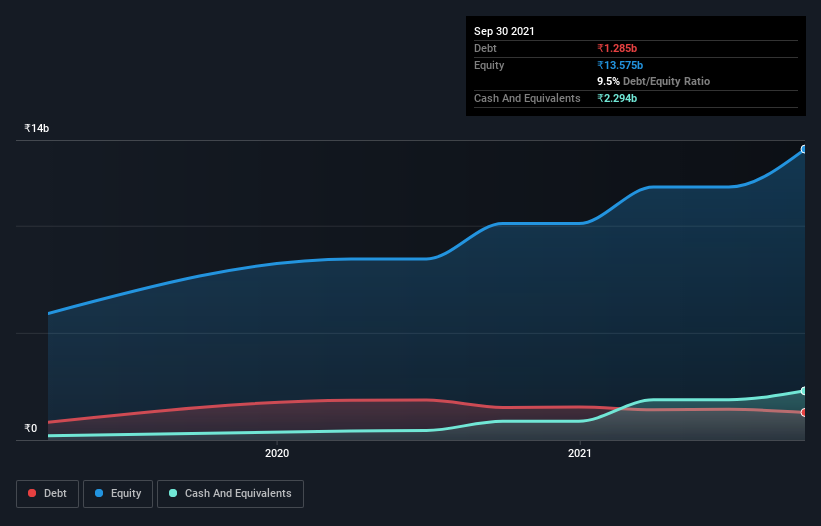These 4 Measures Indicate That Suven Pharmaceuticals (NSE:SUVENPHAR) Is Using Debt Safely

The external fund manager backed by Berkshire Hathaway's Charlie Munger, Li Lu, makes no bones about it when he says 'The biggest investment risk is not the volatility of prices, but whether you will suffer a permanent loss of capital.' So it might be obvious that you need to consider debt, when you think about how risky any given stock is, because too much debt can sink a company. We can see that Suven Pharmaceuticals Limited (NSE:SUVENPHAR) does use debt in its business. But the more important question is: how much risk is that debt creating?
Why Does Debt Bring Risk?
Debt and other liabilities become risky for a business when it cannot easily fulfill those obligations, either with free cash flow or by raising capital at an attractive price. If things get really bad, the lenders can take control of the business. However, a more usual (but still expensive) situation is where a company must dilute shareholders at a cheap share price simply to get debt under control. By replacing dilution, though, debt can be an extremely good tool for businesses that need capital to invest in growth at high rates of return. When we examine debt levels, we first consider both cash and debt levels, together.
Check out our latest analysis for Suven Pharmaceuticals
What Is Suven Pharmaceuticals's Debt?
As you can see below, Suven Pharmaceuticals had ₹1.29b of debt at September 2021, down from ₹1.52b a year prior. But on the other hand it also has ₹2.29b in cash, leading to a ₹1.01b net cash position.

How Healthy Is Suven Pharmaceuticals' Balance Sheet?
According to the last reported balance sheet, Suven Pharmaceuticals had liabilities of ₹2.29b due within 12 months, and liabilities of ₹760.3m due beyond 12 months. Offsetting this, it had ₹2.29b in cash and ₹1.64b in receivables that were due within 12 months. So it can boast ₹884.8m more liquid assets than total liabilities.
This state of affairs indicates that Suven Pharmaceuticals' balance sheet looks quite solid, as its total liabilities are just about equal to its liquid assets. So it's very unlikely that the ₹124.0b company is short on cash, but still worth keeping an eye on the balance sheet. Simply put, the fact that Suven Pharmaceuticals has more cash than debt is arguably a good indication that it can manage its debt safely.
Another good sign is that Suven Pharmaceuticals has been able to increase its EBIT by 27% in twelve months, making it easier to pay down debt. When analysing debt levels, the balance sheet is the obvious place to start. But it is future earnings, more than anything, that will determine Suven Pharmaceuticals's ability to maintain a healthy balance sheet going forward. So if you're focused on the future you can check out this free report showing analyst profit forecasts.
Finally, a company can only pay off debt with cold hard cash, not accounting profits. Suven Pharmaceuticals may have net cash on the balance sheet, but it is still interesting to look at how well the business converts its earnings before interest and tax (EBIT) to free cash flow, because that will influence both its need for, and its capacity to manage debt. Over the most recent three years, Suven Pharmaceuticals recorded free cash flow worth 57% of its EBIT, which is around normal, given free cash flow excludes interest and tax. This free cash flow puts the company in a good position to pay down debt, when appropriate.
Summing up
While it is always sensible to investigate a company's debt, in this case Suven Pharmaceuticals has ₹1.01b in net cash and a decent-looking balance sheet. And it impressed us with its EBIT growth of 27% over the last year. So is Suven Pharmaceuticals's debt a risk? It doesn't seem so to us. There's no doubt that we learn most about debt from the balance sheet. However, not all investment risk resides within the balance sheet - far from it. These risks can be hard to spot. Every company has them, and we've spotted 1 warning sign for Suven Pharmaceuticals you should know about.
When all is said and done, sometimes its easier to focus on companies that don't even need debt. Readers can access a list of growth stocks with zero net debt 100% free, right now.
New: Manage All Your Stock Portfolios in One Place
We've created the ultimate portfolio companion for stock investors, and it's free.
• Connect an unlimited number of Portfolios and see your total in one currency
• Be alerted to new Warning Signs or Risks via email or mobile
• Track the Fair Value of your stocks
Have feedback on this article? Concerned about the content? Get in touch with us directly. Alternatively, email editorial-team (at) simplywallst.com.
This article by Simply Wall St is general in nature. We provide commentary based on historical data and analyst forecasts only using an unbiased methodology and our articles are not intended to be financial advice. It does not constitute a recommendation to buy or sell any stock, and does not take account of your objectives, or your financial situation. We aim to bring you long-term focused analysis driven by fundamental data. Note that our analysis may not factor in the latest price-sensitive company announcements or qualitative material. Simply Wall St has no position in any stocks mentioned.
About NSEI:SUVENPHAR
Suven Pharmaceuticals
Operates as a bio-pharmaceutical company in India, the United States, Europe, and internationally.
Exceptional growth potential with flawless balance sheet.


